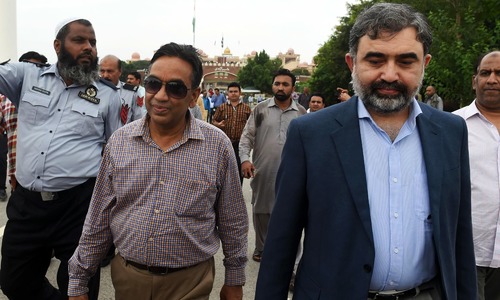Pakistan's objections over two controversial water storage and hydropower projects being built by India continued to exist after the first round of the two-day Pakistan-India Permanent Indus Commission talks between the two neighbours in Lahore on Wednesday, DawnNewsTV reported.
Islamabad has its concerns over the construction of 1000MW Pakal Dul and 48MW Lower Kalnai hydroelectric projects on River Chenab — to address which, a nine-member New Delhi delegation, led by Indian Water Commissioner P K Saxena, had arrived in Lahore via Wagah border yesterday.
The Pakistani authorities today raised their objections over the designs of the two projects and "demanded a reduction of five metres in the height of the Pakal Dul project".
They also urged the Indian representatives to "clarify the filling up and vacating pattern of the lake for Pakal Dul hydroelectric power plant".
The meeting today was the seventh of its kind on the twin hydroelectric projects since 2013.
The second round of the talks will take place tomorrow.
Pakistan's concerns
Both projects — Pakal Dul and Lower Kalnai — are on two different tributaries of Chenab river. India had promised in March last year to modify the designs of the two projects and address Pakistan’s concerns but in vain.
Instead, Prime Minister Narendra Modi laid the foundation stone of 1000MW Pakal Dul project in May this year to kickstart the project, without addressing Islamabad’s reservations. According to Indian media reports, the project’s completion is targeted within 66 months with a commitment to provide 12 per cent free of cost electricity to India-held Jammu and Kashmir.
A former water sector official said it was typical Indian style to build projects in violation of the 1960 treaty as was evident from all previous controversial projects like Baglihar and Kishanganga. During execution of these projects, New Delhi engaged Islamabad in technicalities, but kept civil and side works moving for years until reaching the fait accompli stage, when challenged at international forums.
Pakistan has objections to the pondage and freeboard of Lower Kalnai and pondage, filling criteria and spillway of Pakal Dul hydropower projects on Marusadar River — a right bank tributary of the Chenab.
Pakal Dul is a storage-cum-power project and can have gross storage of about 108,000 acre feet of water. The project design envisages its filling every monsoon season between mid-June and end-August.
Pakistan is of the opinion that the tunnel spillway of Pakal Dul should be raised closer to the dead storage level because its placement 40 metres below the dead storage level could allow drawdown flushing not permitted to India under the 1960 water treaty.
Pakal Dul dam-cum-hydropower project is three times larger than Kishanganga Hydroelectric Project that Pakistan believes has been built in violation of the treaty. Islamabad is seeking international arbitration without success at the level of intransigent World Bank administration.
On the 48MW Lower Kalnai project, Pakistan has raised objections to its freeboard, pondage and intake and is of the view that the depth of bridge girder and provision of freeboard should be close to one metre and considers two-metre freeboard as ‘excessive’.
Pakistan has also challenged the discharge series of River Lower Kalnai at Dunadi for winter months and estimated permissible pondage of 0.38 cubic megametres compared to Indian design pondage of 2.74 cubic megametres.
The Lower Kalnai project is on a left bank tributary of Chenab and can have gross storage of about 1,508 acre feet of water.
Under the provisions of the Indus Waters Treaty 1960, waters of the eastern rivers — Sutlej, Beas and Ravi — had been allocated to India and the western rivers — the Indus, Jhelum and Chenab — to Pakistan, except for certain non-consumptive uses for India.













































